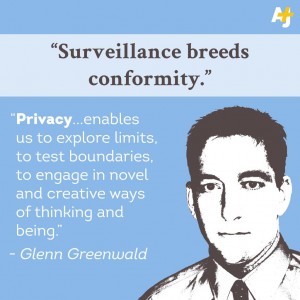Many defenders of mass surveillance use the argument that “only people involved in bad acts should worry about their privacy.”
In some ways, this seems to make sense. After all, if you’re doing something you don’t want people to know about, maybe you shouldn’t be doing it in the first place, right?
Glenn Greenwald, one of the first journalists to report on the Snowden leaks, recently debunked this argument in a TED talk, explaining why privacy still matters.
- Privacy is essential to our psychological well-being
A desire for privacy is not necessarily a desire to hide dishonest actions. Consider the following question: why is it that we put locks on the doors of our homes, and passwords on our social media accounts? If you are comfortable with the government sifting through your emails, would you also welcome them rummaging through your belongings? We do not necessarily seek out personal space and intimate communication because we are engaging in criminal acts, but because these are the spaces in which we feel safe, secure, and in control.
- We all have something to hide
Greenwald points out that there may be things we are willing to share with our doctors, lawyers, and spouses that we would be mortified to share publically. Similarly, your conversations with your boss are likely vastly different than those you have with your best friend.
We are constantly, and even subconsciously, making judgments about the things that we are comfortable with sharing in the public realm, versus our private one. Professional and personal situations are also informed by different social norms. The disappearance of privacy would blur these lines, and cause a multitude of problems – as the advent of social media continues to demonstrate time and time again.
- Our behavior changes when we are being watched
Dozens of psychological studies have shown that humans change their behavior when they are aware they are being watched. Shame is a powerful motivator, as is the desire to avoid it. The assumption that we are being watched therefore creates compliance and self-censorship. This limits freedom of expression and creativity, and would have a severe chilling effect on activists and journalists, the people who ultimately strive to hold government accountable.
To watch the full TED talk, click here: http://www.ted.com/talks/glenn_greenwald_why_privacy_matters?language=en#t-619092
For more on government surveillance programs, click here: https://dt2019.sites.olt.ubc.ca/connect/usa-surveillance-programs/


